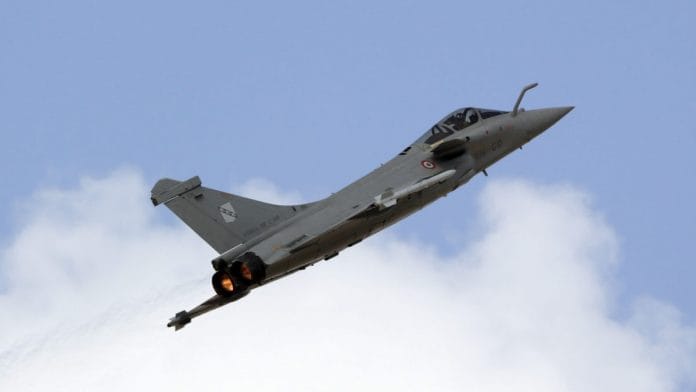New Delhi: French defence major Dassault Aviation is likely to start manufacturing parts of the Rafale fighter jets at its India facility this year, with the wares destined for global customers, ThePrint has learnt.
The Indian facility, a joint venture with Anil Ambani’s Reliance Defence, is located in Nagpur.
According to industry sources, the French firm has already carried out a test production of certain parts that could be manufactured here. A formal announcement to this effect, they said, could come in September, when the first of the 36 Rafale ordered by the Indian Air Force are handed over in France.
The Nagpur facility of Dassault Reliance Aerospace Limited (DRAL) is currently making cockpits for the French manufacturer’s Falcon business jets, besides other parts. It is being used as a “test bed” for the possible manufacturing of fighter jet parts.
The industry sources told ThePrint that the plan was to start with smaller parts like the undercarriage door, before going on to bigger ones.
Also read: Everything you wanted to know about Rafale and did not know who to ask
A ‘u-turn’
Reports of the Nagpur facility churning out fighter jet parts come months after Dassault Aviation CEO Eric Trappier said the company had no plans to manufacture Rafale parts in the country if India capped its order at 36 jets.
When the first Falcon 2000 cockpit front section manufactured at Nagpur was ready to be handed over to Dassault this February, the company said the “achievement illustrates Dassault Aviation’s determination to build up an Indian aerospace manufacturing eco-system, matching the highest standards in this field and positioning India as an international reference in the global aerospace market”.
Dassault and Reliance announced their joint venture and the creation of DRAL on 3 October 2016, barely two weeks after India signed a 7.878 billion-euro deal for 36 Rafale jets in a flyaway condition. The joint venture plans to recruit and train 650 employees by 2022, with the eventual aim being the rollout of a complete Falcon from Nagpur.
The DRAL facility was inaugurated in October 2017, in the presence of both Trappier and Ambani.
The joint venture has been in the eye of a storm over the opposition’s allegations that the Narendra Modi government had shown undue favour to get Dassault Aviation to pick Reliance Defence as an offsets partner. The government was given a clean chit on the deal by the Supreme Court in December last year, but the top court is currently hearing a review petition against the order.
Also read: There’s a humongous scam in the Rafale deal. It is called stupidity







This totally falsifies Rahul Gandhi’s claim that JV with Reliance (Anil Ambani Group) will be manufacturing 36 Rafale planes ordered by India. The true facts, as reported by Dassault, are that that the Nagpur facility will be used to supply components for Falcon planes. As per Indian norms, any MNC company engaged in defence manufacturing can have a JV with an Indian company with a stake not exceeding 49%. So, where is the illegality? Dassault has plans to expand this activity at Nagpur so as to make complete production of Falcon planes, as as to make a significant cost savings that can give Dassault a competitive edge in the international market. Can this investment, which as per the current reports is not likely to exceed Rs. 900 crore be counted for offset computation? Definitely yes. Offsets can be classified into two types – direct and indirect. Direct offsets involves co-production and transfer of technology, whereas indirect offsets may or may not related to the contracted sell-purchase activity ( manufacture of Rafale planes in the instant case). If one refers to para 3.1 (a) to (d) of DPP 2013 both types of offsets are allowed. Additionally investment in research activity of DRDO is also eligible (paras 3.1 (e) & (f) with a multiplier effect (higher weightage). Furthermore, para 71 of the DPP states : – ” There may be occasions when procurements would have to be done from friendly foreign countries which may be necessitated due to geo-strategic advantages that are likely to accrue to our country. Such procurements would not classically follow the Standard Procurement Procedure and the Standard Contract Document but would be based on mutually agreed provisions by the Governments of both the countries. Such procurements will be done based on an Inter Governmental Agreement after clearance from CFA. ” Para 73 states:-. “In certain acquisition cases, imperatives of strategic partnerships or major diplomatic, political, economic, technological or military benefits deriving from a particular procurement may be the principal factor determining the choice of a specific platform or equipment on a single vendor basis. These considerations may also dictate the selection of particular equipment offered by a vendor not necessarily the lowest bidder (L1). Decisions on all such acquisitions would be taken by the Cabinet Committee on Security (CCS) on the recommendations of the DPB.”. Lastly as per para 8.11 of Appendix D it is stated that : “ In exceptional cases, DOMW may recommend change in offset partner or offset component on being convinced that the change is necessary to enable the vendor to fulfil offset obligations.”. Thus, Dassault is free to change Reliance if Reliance is not able to bring in required matching investment! This is the most likely scenario taking into account the weakened financial position of ADAG group.